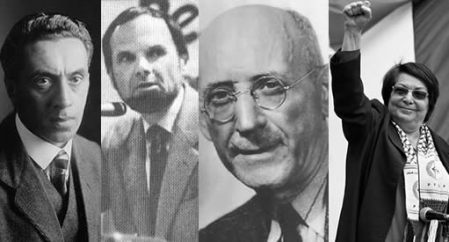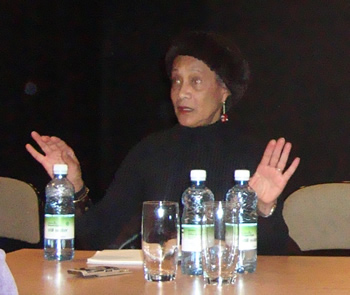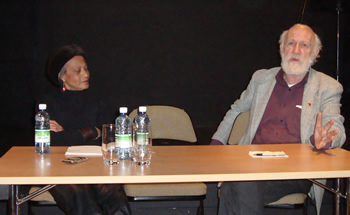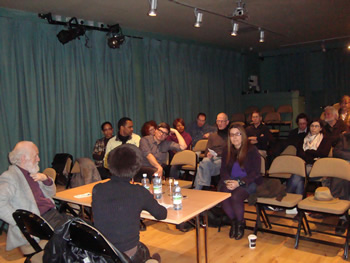
The story about Steven L. Anderson, the exterminationist, homophobic, antisemitic and Islamophobic US preacher being banned from Ireland has gained a lot traction over the past couple of days. Most reports say he is “first-ever person to be banned from Ireland“, or some variation thereof.
But this isn’t strictly true. While he is seemingly the first visiting speaker to have been banned under the 1999 Immigration Act, there have been others before him – and they were mostly all leftwing activists.
Ernst Tollman
 The first public speaker that I’m aware of being denied entry to the independent south of Ireland (or, the ‘Irish Free State’, as it was called between 1922 and 1937) was German Jewish dramatist Ernst Toller. Aside from being a well known playwright, Toller was revolutionary leftist and anti-fascist, who had briefly served as the President of the heroic and short-lived Bavarian Soviet Republic in 1919.
The first public speaker that I’m aware of being denied entry to the independent south of Ireland (or, the ‘Irish Free State’, as it was called between 1922 and 1937) was German Jewish dramatist Ernst Toller. Aside from being a well known playwright, Toller was revolutionary leftist and anti-fascist, who had briefly served as the President of the heroic and short-lived Bavarian Soviet Republic in 1919.
In 1935, when he was invited to speak in Dublin by the Irish Labour League Against Fascism, he was a refugee in his second year of exile from Nazi Germany. He was refused entry by the De Valera government, at the behest of the Nazi Embassy in Dublin:
“Toller’s activities were regularly monitored by the German Embassy, being no doubt a source of some embarrassment; in January 1935 he began a series of lectures which finally provoked the Embassy into direct intervention. On January 10 a diplomat called zu Putlitz requested a meeting at the Foreign Office at which, according to the official memorandum, he raised the ‘question of German refugees – he was thinking particularly of Ernst Toller – who travelled the country giving speeches against the German government’. He asked that the government should insist that refugees should refrain from anti- German activities during their stay in Britain, and that if they failed to do so, they should be deported. The Foreign Office politely refused, but other efforts to silence Toller were more successful. In the same month, he was invited to address a rally of the Irish Labour League against Fascism on ‘National Socialist Germany’, but was refused permission to enter Ireland following representations by the German Embassy in Dublin.” (‘The British Connection: Aspects of The Biography of Ernst Toller‘, Richard Dove, German Life and Letters 40, 4 July 1987)
However, it seems it was actually a bit less clear cut than that, as Joachim Fischer expands on this in a an essay about Toller in the edited book German Writers and Politics 1918–39. He notes that Toller was invited to come to Ireland to speak at the event by Dorothy Woodman of the London-based Victims Relief Committee. Toller met with John Dulanty, the Irish High Commissioner in London to discuss the visit, and according to the minutes of tha meeting, he was ‘well advised’ not to go as there would be talk of ‘communism’ at the meeting:
“While the Irish Labour League Against Fascism saw the meeting as part of its campaign to free the German Communist leader Ernst Thalmann, Toller made it clear that he intended to speak also about the conditions in which priests and pastors found themselves in Germany … We can assume that this choice of topic was determined to some extent by the expected Irish audience. It seems however that Toller was not fully informed about the meeting’s organisers, who he thought were associated with the Labour Party. When the High Commissioner explained to him that avowed Communists were among the organisers of the meeting (which was true) and that a discussion about Communism would be almost unavoidable, Toller appeared very hesitant to go. Toller must have been aware that too close an association with the Communists would jeopardise his campaign [to have imprisoned German socialist and pacifist Carl von Ossietzky awarded the Nobel Peace Prize] during which he also approached people from the upper classes and the church hierarchy.
“In the minutes Toller appears very cautious indeed. ‘He was anxious not to do anything contrary to the wishes of the authorities here or in Dublin’, ‘he was anxious to avoid any press publicity’, we read there. Both sides try very hard to leave the final decision (and the responsibility for it) to the other. The High Commissioner also takes steps to protect himself: ‘The High Commissioner made it clear that there was no suggestion of a prohibition or a ban but as Mr. Toller himself was keen on avoiding any public discussion on Communism he would be well advised not to give the proposed lecture. Mr. Toller agreed’, the minutes state. They finally agree on a press statement which says no more than that Toller ‘is advised by a responsible quarter’ not to go to Dublin.” (‘Ernst Toller and Ireland’, Joachim Fischer, German Writers and Politics 1918–39, 1992).

Yet as Fischer notes, “In Dublin, however, it looked very much like a ban”, as “the German Legation in Dublin had made representations to the Irish government”, and that “informed circles” knew that Toller’s potential appearance “threatened to endanger the success of ongoing trade talks between the Free State and the Reich”.
In any case the meeting went ahead without Toller, with speakers that included ‘avowed communists’ Peadar O’Donnell, Roddy Connolly (son of James), and Séan Murray. It seems the government were unsure whether or not Toller would take their “advisement” on board as “police were present at the Hall in significant numbers” and “were there to prevent Toller from speaking and even deportation was mentioned”.
Tragically, fascism would continue to haunt Toller throughout the rest of his relatively short life. After learning his brother and sister had been sent to concentration camps, suffering depression and financial woes, and seemingly reeling from the ultimate defeat of the Spanish Republic by Franco’s fascists the previous month, on 22nd May 1939, aged only 45, he hanged himself in a New York hotel room. As Jean-Michel Palmier notes in his book Weimar in Exile:
“A moral, political and psychological crisis for many emigres, the Spanish defeat appeared as a collapse of their last hope of victory over Hitler. It was not by mere chance that before his suicide, Ernst Toller laid out on his desk in the Mayflower Hotel in New York photos of Spanish children who had been killed by fascist bombs.” (Weimar in Exile: The Antifascist Emigration in Europe and America, Jean-Michel Palmier, 2006)
Ralph Schoenmann
 The first public speaker I’m aware of being refused entry to the ‘Republic of Ireland’ was Trostkyist anti-war activist and associate of Bertrand Russell, and wearer of one of the worst beards in human history, Ralph Schoenman. Schoenman, who these days is a leftist conspiracy theorist, was detained at Dublin airport, moved to Mountjoy Prison, and promptly deported to Belgium in May 1968, whereupon he went to France and ended up in the midst of the Paris uprising.
The first public speaker I’m aware of being refused entry to the ‘Republic of Ireland’ was Trostkyist anti-war activist and associate of Bertrand Russell, and wearer of one of the worst beards in human history, Ralph Schoenman. Schoenman, who these days is a leftist conspiracy theorist, was detained at Dublin airport, moved to Mountjoy Prison, and promptly deported to Belgium in May 1968, whereupon he went to France and ended up in the midst of the Paris uprising.
There is a wonderfully colourful Senead debate between Senator Owen Sheehy-Skeffington – who in a twist of history had aslo been involved in the Toller affair as a member of the aforementioned Irish Labour League Against Fascism – and Fianna Fáil Minister of Justice Michael Moran.
Amid accusations that Schoemean was seen “at the demonstration in Paris with the black flag of anarchy”, was an “international Communist agitator” and “a potential tourist” (yes, a tourist, the horror!) comes this wonderful soliloquy from the Minister:
“I exercised my judgment in stopping this potential tourist landing on our shores for my own good reasons. I do not have to give the reasons why that was done. Let me say that I was not alone in my view that this gentleman would not add anything to the future of our country and I could give you a litany here of very many others who took a similar view to mine about this same gentleman. He was pitched out of Holland; he was pitched out of France; he was pitched out of Bolivia; he was pitched out of Denmark; he was pitched out of Sweden; he was pitched out of West Germany; he was pitched out of Finland; he was pitched out of Austria; and he was pitched out of other countries. In fact, his own Government, I am sure, would love to have some place to stick this particular agitator, but under American law a citizen has a right to a passport and he is still an American citizen. That is why he was roaming around the world […]
“This international Communist agitator has been pitched out of all the countries I have read out in this House. In addition to that, he prostituted the procedures in our Irish courts by using them with his friends when asked by his friends to this country for his own particular purpose. He had his way, allegedly undertaking to the courts to go back to Rome from where he came to this country, and he disappeared from the plane at Brussels. We have the picture Senator Ó Maoláin  has referred to appearing at the barricades at Paris the following day. This is the gentleman the Senator and his friends are so concerned about. […] there is no responsible Minister for Justice who would let a type like this into this country for his own fell purposes. There may be some misguided people in this country who would take the view of the Senator in this motion but the vast majority of the Irish people have no hesitation in saying that they do not want this type of international tourist agitator in this country […] if there are some of his type who want to come here as aliens and I know they are coming I will ensure that they will lay their agitators’ eggs elsewhere and I make no apology to the Senator or his friends in this regard.” (‘Adjournment Debate – Visit of Ralph Schoenman‘, Seanad Éireann, 29 May 1968).
has referred to appearing at the barricades at Paris the following day. This is the gentleman the Senator and his friends are so concerned about. […] there is no responsible Minister for Justice who would let a type like this into this country for his own fell purposes. There may be some misguided people in this country who would take the view of the Senator in this motion but the vast majority of the Irish people have no hesitation in saying that they do not want this type of international tourist agitator in this country […] if there are some of his type who want to come here as aliens and I know they are coming I will ensure that they will lay their agitators’ eggs elsewhere and I make no apology to the Senator or his friends in this regard.” (‘Adjournment Debate – Visit of Ralph Schoenman‘, Seanad Éireann, 29 May 1968).
Incidentally, during the debate Fianna Fáil Senator Thomas Mullins claims
that he was coming to Ireland to “support the Chinese Communists in Trinity“. I think the TCD Internationalists would have given the Trotskyist Schoenman short shrift. In fact, they’d probably have denounced him even more vociferously than the Irish government did!
James Gralton
Of course, before either of these two, the was the case of Leitrim man James Gralton – now famous as the subject of the Ken Loach/Paul Laverty film Jimmy’s Hall. Gralton was a communist activist, who:
“joined the Revolutionary Workers’ Group (forerunner of the Communist Party of Ireland) and reopened the Pearse-Connolly Hall [in Leitrim], which became the venue for meetings as well as dances; but a combined anti-communist and puritanical witch hunt, in which the parish priest called for the closing of the hall as a ‘den of iniquity,’ resulted in shots being fired into the hall and an unsuccessful attempt at blowing it up (allegedly by local members of the IRA), and on Christmas Eve, 1932, it was again burnt to the ground.” (‘Some famous Irish communists – Jim Gralton (1886-1945)‘, Communist Party of Ireland)
 Gralton was such a ‘danger’ to the state that in February 1933, under pressure from the Catholic Church, the De Valera government of the Irish Free State issued a deportation order for him as an “undesirable alien” – despite being born in Leitrim, Gralton held dual Irish and US citizenship. Despite refusing to abide by the order and going underground, he was eventually caught and deported to the US in August of that year, having the dubious honour of being the only Irishman ever deported and exiled from Ireland by an Irish government.
Gralton was such a ‘danger’ to the state that in February 1933, under pressure from the Catholic Church, the De Valera government of the Irish Free State issued a deportation order for him as an “undesirable alien” – despite being born in Leitrim, Gralton held dual Irish and US citizenship. Despite refusing to abide by the order and going underground, he was eventually caught and deported to the US in August of that year, having the dubious honour of being the only Irishman ever deported and exiled from Ireland by an Irish government.
He continued his leftwing activism in the US up until his death in 1945. Only in 2016 was an official state apology delivered, with President Michael D. Higgins stating that:
“Today, I come to acknowledge a too long hidden or suppressed story – the wrongful intimidation and ultimate deportation by an abuse of the law, of Jimmy Gralton, to whose memory, and whose family, an apology is due […] We can recall him with sadness, but also with righteous anger, because he was, for authoritarian political purposes, mixed with clerical pressure, illegally deported from his own country for his political beliefs. What happened was an affront to basic civil rights and freedoms, including freedom of speech; freedom to organise and the freedom to hold meetings.” (‘Speech at the unveiling of a monument to Jimmy Gralton‘, President Michael D. Higgins, 3 September 2016)
Leila Khaled

More recently, the was the 2013 case of the refusal to grant an entry visa to Palestinian revolutionary and exile Leila Khaled to speak at a conference organised by the socialist republican political party éirígí. Its worth noting that Khlaed was previously granted a visa to enter Ireland to speak at a series of meetings in 2005. According to a press release from the party:
“Leila Khaled is a senior member of the Political Bureau of the Popular Front for the Liberation of Palestine (PFLP) and an iconic figure in the Palestinian struggle for self-determination. Failure by the Dublin government to grant her an entry visa in time has prevented her travelling to Ireland for the éirígí conference and several other events. Ms Khaled had submitted her visa application several weeks ago at the same time as Mr Al-Khatib who works closely with Ms Khaled in the Jordanian capital, Amman.
“The general secretary of éirígí, Breandán Mac Cionnaith, said, “Of course, we are extremely disappointed at the level of prevarication shown by the Dublin government over the issue of Ms Khaled’s visa. Having been in very regular contact with Ms Khaled over the past number of months, it is quite clear that she is particularly disappointed and frustrated at not being given clearance to travel. She again expressed those sentiments to me no later than this morning (Friday).’
“It appears that the Dublin government is pandering to the wishes of the US, British and Israeli governments in relation to her visa application. That is clearly evidenced by the fact that, although both were to travel together and both visa applications were submitted at the same time, Mr Al-Khatib’s visa was granted without hesitation.
These are likely only some of the cases of people refused entry or banned from the country – and they do not take into consideration the thousands of people who are not public speakers, activists or agitators (whether from the left or the right) who are refused entry to Ireland due to our racist immigration laws. Between 2016 and 2017 some 8,000 people were denied entry to the state.
As a final note, I would like to note that these people stand in start contrast to some of the vile characters have been allowed entry to Ireland down the years – whether to speak or to reside. I’m talking about fascist swine like mass murderer Andrija Artukovic of the Ustaše, Waffen SS-Obersturmbannführer Otto Skorzeny, Breton Nazi-collaborator and local Waffen SS commander Celestine Laine, Oswald Mosely of the British Union of Fascists, and Nazi Holocaust denier David Irving.
UPDATE 17 MAY 2019: Since publishing this I have come across the story of a further banned individual, one Pieter Menten, a millionaire Dutch Nazi war criminal. A former Officer in the SS in Poland, Menten was responsible for the deaths of many Jews (and being an art collector, allegedly the theft of many artworks). Although tried and convicted of being an SS translator in post war Netherlands, the other allegations were not proven. In 1964 he moved to Ireland and bought Comeragh House in Co. Waterford, where he lived until 1976 when he was arrested by Dutch court, re-tried and brought to some semblance of justice.
When he was released from prison in 1985, he had planned to return to Ireland to live out his days. However, the Irish government of Garret Fitzgerald had designated him “an undesirable alien and banned him from entering Ireland”. Ir seems likely than rather than any moral objection, the overriding concern was that any “decision to admit Menten may provoke a certain amount of international controversy” in the words of a secret document from the department of the Taoiseach. There was also the worry that either Poland or the Soviet Union could attempt to extradite Menten, thus embroiling ‘neutral’ Ireland in the Cold War, and likely annoying the US Cold Warriors. In the end, Menten died two years later in Holland.













